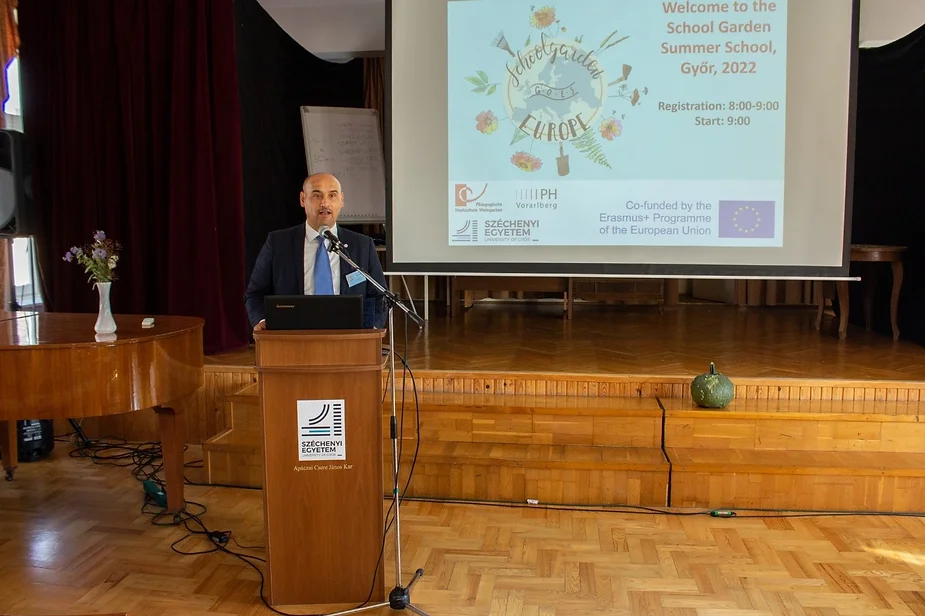The world's first International School Garden Week was held at Széchenyi István University
Preparation for school garden education is part of the teacher training in Győr. Széchenyi István University, as one of the Hungarian centres of the topic, hosted the international programme week “School Garden goes Europe”, which was realised within the framework of the Erasmus+ strategic partnership project. Its main objective is to enable as many children as possible to benefit from the positive effects of school gardens and kindergarten gardens by bringing together school garden experts and sharing knowledge.
School gardens develop a range of skills in children and help raise their environmental awareness, emphasising the importance of sustainability.
The School Garden goes Europe Erasmus+ Strategic Partnership project aims to network and share knowledge between EU institutions and experts working on school gardens. The international School Garden Summer University Course, which took place partly through distance learning and partly in person, was organised in the School Garden of the Apáczai Faculty of Széchenyi István University.
This unique course brought together participants from seven countries who had the opportunity to learn from German, Austrian and Hungarian teachers in English. The international training course was held at the Faculty of Education, Humanities and Social Sciences of Széchenyi István; among the project partners were the German Weingarten University of Education, the Austrian Vorarlberg University of Education, and as an affiliated partner the Foundation for School Gardens.
 The participants of the international programme week were welcomed by Dr. Attila Pongrácz, Dean of the Apáczai Faculty
The participants of the international programme week were welcomed by Dr. Attila Pongrácz, Dean of the Apáczai Faculty
Photo: Márton Horváth)
The online learning materials developed in the project provided in-depth information on the management and educational use of school gardens, while the practical sessions highlighted some of the little-known possibilities of school gardens.
Participants from Austria, the Czech Republic, Hungary, Germany, Romania, Slovakia and Slovenia were given a session by Attila Csillag, Master's Lecturer at the Department of Social Studies and Sociology of Széchenyi University, on the creation of rules for school gardens and children's emotional attitude towards school gardens.
Prof. Dorothee Benkowitz (Weingarten University of Education), one of the leading European experts on the subject and project leader, gave a presentation on biodiversity, including the maintenance of landscape species in the school garden, and Prof. Stefan Jarau (Vorarlberg University of Education) gave a presentation on zoological observation methods in the school garden and on crate gardening based on the reuse of vegetable crates. Ilona Szelesné Kása (Eötvös Loránd Elementary School), head of the Lakitelek Színeskert, introduced the school garden specialists to painting with plants, and Renáta Barabás (Széchenyi István University, Department of Methodology) introduced the school garden specialists to the crafting with corn husks.

Participants of the Győr course (Photo: Zsolt Nemes)
With Svenja Baumgartinger (Weingarten Pedagogical University), the participants could make pesto, spiced salt and other delicacies from “hidden ingredients”, i.e,. garden produce that is usually already discarded, such as, beetroot leaves. Izolda Mátyás, from the Foundation for School Gardens, offered the opportunity to paint with soils: an activity that is excellent in raising children's awareness of the diversity and conservation of soils.
The organiser of the training, Dr András Halbritter, presented the faculty's school garden and the educational elements it contains, and finally the participants planted a vine together to commemorate what was probably the first international school garden training course ever organised.
On the other days of the week, experts from the partner institutions visited some of the outstanding national school gardens of the School Garden Network and the National School Garden Development Programme. They were also able to visit two of the gardens - the Szent István Körút Unified Institute for Special Education Methodology (EGYMI) in Jászberény and the Radó Tibor Primary School and EGYMI in Győr, where the developmental effects of school garden activities are used to benefit children with disabilities.
On the last day of the week, the course participants visited school gardens in Győr, several of which have been implemented in recent years with the help of Széchenyi István University in the Győr Generations Garden programme. The mini-beds at the Green Road Nursery are a rare example of how gardening can be a meaningful activity for children as young as two. In the gardens of the Tárogató Kindergarten and the Butterfly Kindergarten, the educators have shown that it is in the preschool years that children's emotional attachment to nature can be best developed, which is also the basis for later environmental awareness.
Additionally, the garden of the university's training school, the Öveges Kálmán Training Primary School, offered a case study on how to use local resources to create a natural environment in a small inner-city area in a cost-effective and creative way, that is credible from a sustainability perspective.











